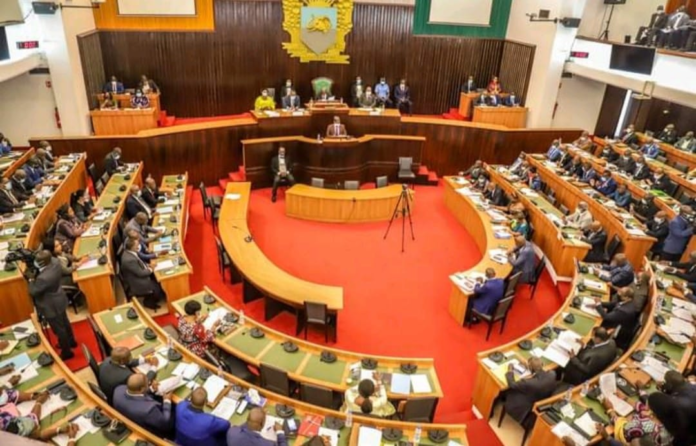Members of the Ivorian Parliament have embarked on a new legislation to abolish same sex marriage in that West African country.
Ivory Coast is among few West African countries including Nigeria that do not recognize two persons of the same sex to marry.
Ivorian lawmakers met in plenary on Tuesday, November 30, 2021, chaired by Adama Bictogo in the absence of Amadou Soumahoro to consider several bills.
The new article 226 of the bill modifying the law n ° 2019 of June 26, 2019 on the code penal was the attraction of the day after the passage on October 28, 2021 of the Keeper of the Seals, the Minister of Justice, Sansan Kambilé to the ‘National Assembly.
It is believed that there has been so much strong reactions in public opinion with the mention “sexual orientation”.
After hearing the report of the General and Institutional Affairs Committee (CAGI) whose members united around the conclusions of their work, the lawmakers present during this plenary unanimously decided that the mention “sexual orientation” which risk of leading to the legalization of homosexuality in Côte d’Ivoire, be withdrawn from the new article 226.
In his commentary, the President of the Commission, Méité Ben Abdoulaye referred to respect for “spiritual, religious and cultural values” as mentioned in the Ivorian constitution.
“In Côte d’Ivoire, what is in accordance with the constitution is heterosexuality, this is false, there has never been a desire for homosexuality in Côte d’Ivoire”, he noted.
Report of the General and Institutional Affairs Committee followed by the Representatives “the Commission, while congratulating the emissary of the President of the Republic for the efforts made to improve the code penal, deplored the presence, considered underhand, of the notion of “sexual orientation” in the legal framework of this law.
The bill is the explanatory memorandum providing no explanation of its necessity and scope.
In this regard, the Commission considered that due to its sensitivity, any question relating to a sexual orientation other than that which conforms to our cultural realities, requires further reflection in a more appropriate framework”.
In return, the envoy of the President of the Republic declared that he understood the concerns expressed by the Commission in relation to the said notion, which according to him, was intended only to protect criminally a certain category of people prey to certain forms of discrimination, and not to legalize any other form of marriage.
On the drafting of the bill, the Commission, while welcoming the will of the President of the Republic to comply with international commitments, wanted to know whether this bill is in line with the interests of the populations.
In response, the envoy of the President of the Republic indicated that, like the reform of the code penal, the proposed modifications benefited from the support of various Experts, civil society and even international partners such as the World Bank.
The envoy of the President of the Republic concluded by clarifying that the preparation of this bill is not a personal work, but a work of general interest.
On Article seven (7) the Commission, while welcoming the innovations contained in the bill, expressed its disapproval of the allusion made to the notion of sexual orientation, subtly inserted in the new Article 226.
After having defined discrimination as the fact of treating unequally and unfavorably one or more individuals.
The Commission explained that this could not be considered with the notion of sexual orientation, it is being understood that the only known and legal relationship remains the natural union between man and woman.
In return, the envoy of the President of the Republic clarified that the government had no interest in deceiving the Ivorian parliament and the allusion to this concept, which intends to protect certain minorities criminally.
The President’s envoy endorsed the proposed amendment to remove the notion of sexual orientation from new Article 226.
Thus, the notion of sexual orientation withdrawn from the new article 226 of the bill and the envoy of the President of the Republic proposed the rewriting below:
“For the purposes of this section, is qualified as discrimination, any distinction, exclusion, restriction or preference based in particular on national or ethnic origin, race, color, descent, sex, marital status.
According to our National correspondent in Ivory Coast, the lawmakers deemed the practice of same sex as being against the cultural, religious and norms of the country.






















